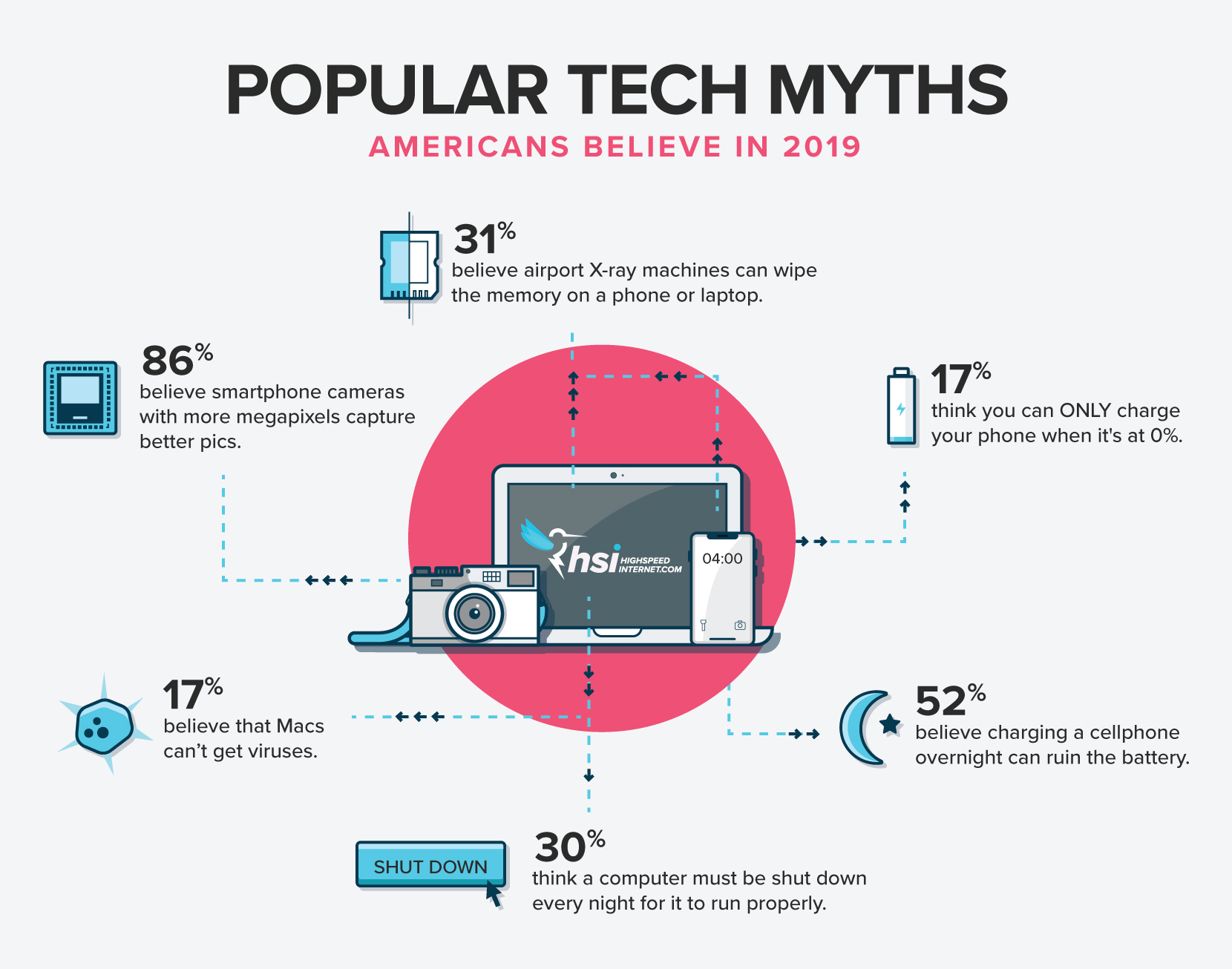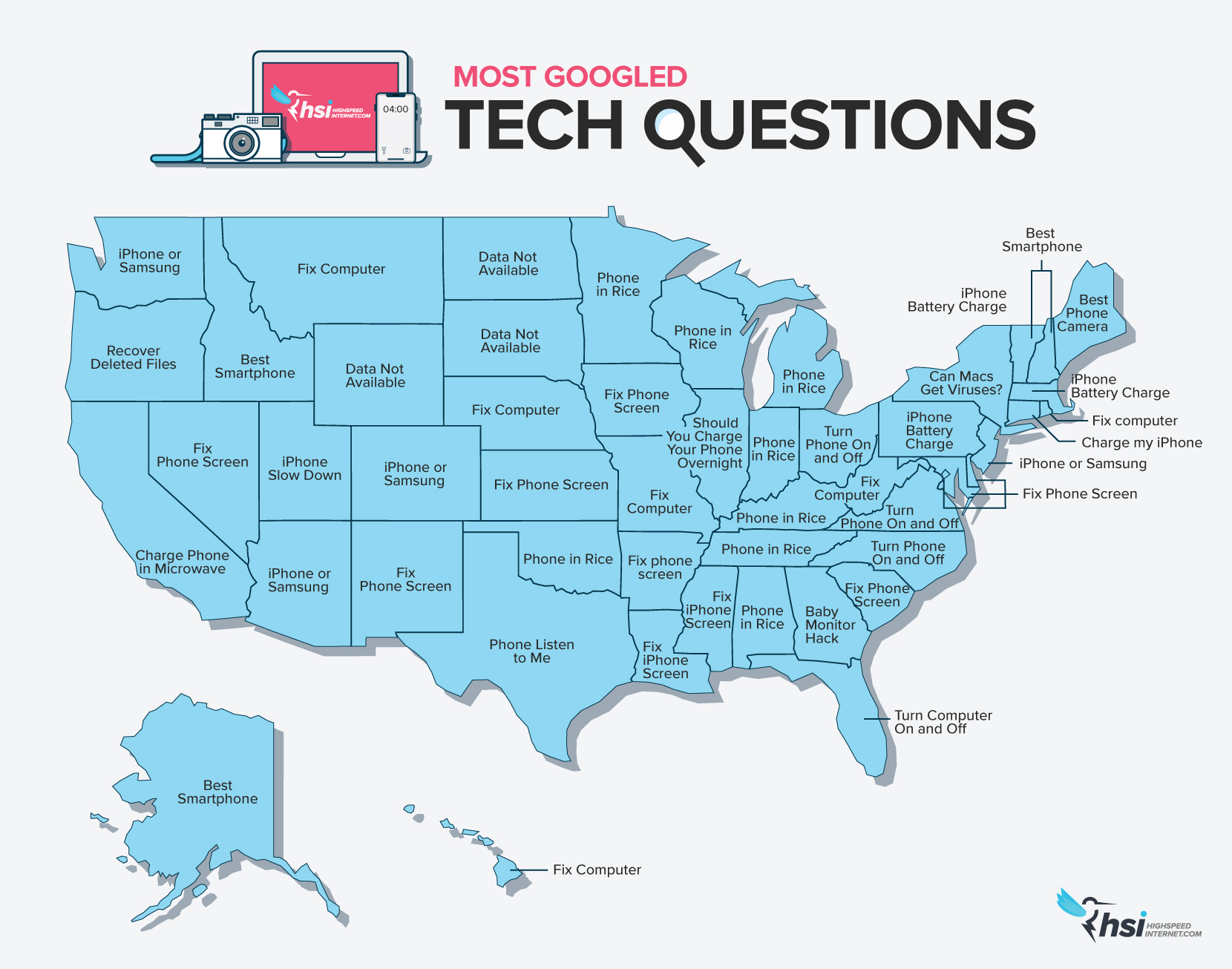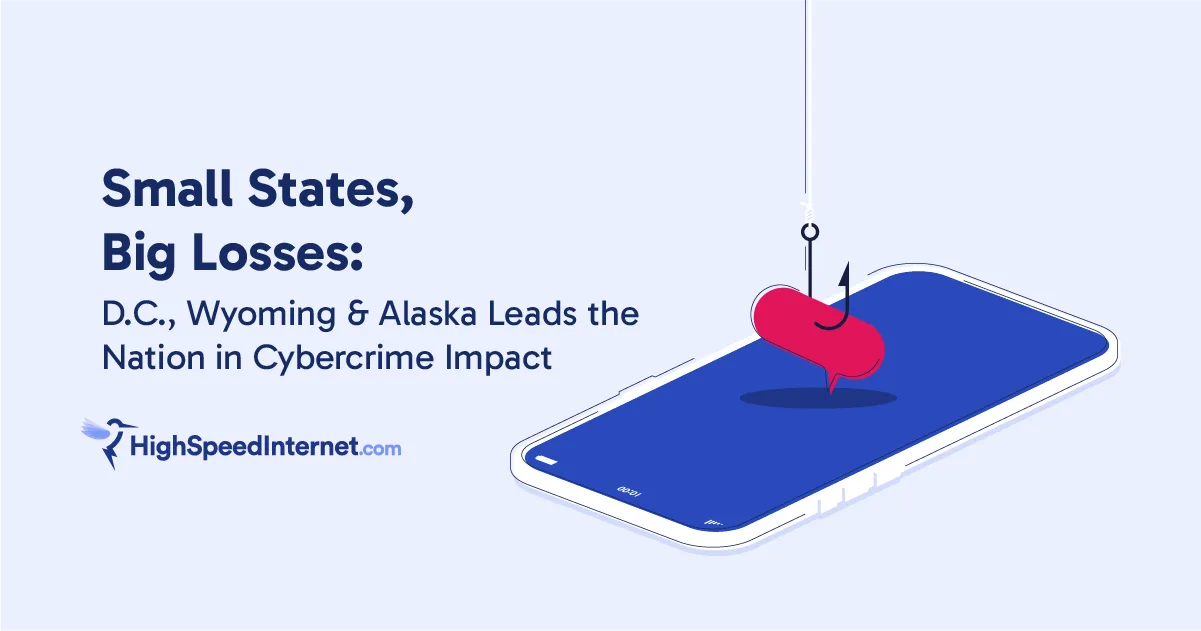Popular Tech Myths Americans Believe in 2019
Jan 7, 2019 | Share
Industry Exclusive/Entertainment
Making sense of the fakes, fails, and surprising facts.
Keeping up with all the ins and outs of technology in this rapidly changing world can be difficult. It’s completely understandable (and unavoidable) for a bit of false information to slip into the conversation here and there. But when misinformation becomes myth, it can persist in the culture for years—long after it’s been debunked.
In addition to looking at some popular tech tales people google around the country, we also surveyed people about the tech myths they still believe. Here’s what we found!

86% believe smartphone cameras with more megapixels capture better pics.
We’ll forgive you for believing this one because it’s tricky. A camera with more megapixels can take pictures with higher resolution, but that doesn’t necessarily mean they’re better quality. The lens and the sensor on your smartphone camera play bigger roles in image quality. For example, if you have a bad lens, you’ll get a bad picture. If you have a bad lens but a lot of megapixels, all you’ll get is a bad picture in high resolution. Woohoo.
52% believe charging a cellphone overnight can ruin the battery.
This myth is more expired than untrue. Nowadays, charging modern smartphone batteries won’t ruin them. Years ago, overcharging cellphone batteries could cause them to overheat or wear down their life cycle. Thankfully, both smartphones and batteries have advanced significantly since then.
52% believe smartphone companies deliberately slow down existing phone models when a new model is released.
Ok, we can’t say for sure that no smartphone company slows down your phone, but it’s hard to prove that it’s done deliberately.
Smartphones slow down over time because advances in software and technology require more system updates that use more processing power. Eventually, these upgrades stretch the limits of an older phone and slow it down. This process happens naturally, so smartphone manufacturers don’t really need to manually slow down phones more than what’s already happening to convince you to buy a new phone.
Still, Samsung and Apple were both accused of deliberate slowing and fined for it in Italy. However, even in that case, all the companies were guilty of was simply telling customers to install the latest operating system. Those systems happened to be designed for the next generation of hardware and caused major issues when installed on the older phones. But was that deliberate? Or just clumsy? We’ll let you decide.
31% believe airport X-ray machines can wipe the memory on a phone or laptop.
The X-rays used by airport security scanners will not erase your hard drive or damage the information on it—you would need a magnet to do that. X-rays can damage images on old-school rolls of film but nothing digital. If your photos are all on your phone, they should be fine.
30% think a computer must be shut down every night for it to run properly.
Shutting down your computer every night doesn’t affect how your computer functions. If you still have a computer from the 1990s, you can possibly extend its life slightly by shutting it down every night, but even that’s debatable.
Modern computers have fewer mechanical components and better power management than previous machines. These advancements minimize the effects of shutting down and restarting your computer. While your computer will need to reboot occasionally to install updates, it doesn’t need to restart every night.
17% believe that Macs can’t get viruses.
Let’s clear this up: Macs can get viruses. They don’t get them as often as PCs, but it happens. This myth likely stems from years past when Apple’s market share was much smaller.
Early Macs had two big advantages to help keep them virus-free: First, the source code was harder to access. Second, the percentage of people with Macs was so small that it wasn’t worth creating a virus for them. Today, Macs are everywhere. While they still limit access to the source code, they’re mainstream enough to be targeted.
12% think deleted files can never be recovered.
Got some texts you regret? Deleting them doesn’t make them disappear. Wish you wouldn’t have posted that picture? Too late. It’s out there.
Deleted files can be recovered, even after you empty the recycle bin. Modern solid-state drives (SSDs) make this more difficult, but it’s still possible with the right recovery software.
When it comes to digital files, just assume everything you create will be around forever.
Most Googled Tech Myths by State
While most of these myths made us lol, plot twist: some of the myths these states googled are true.

Highlights
Here are some of the funner results from our map of most googled tech myths from coast to coast.
California is thinking about charging phones in the microwave.
Californians, do not microwave your phones! A microwave won’t charge your phone and may cause it to explode. That’s the opposite of what you want.
Georgia is worried their baby monitors will get hacked.
Congratulations, Georgia. Your most googled tech myth turns out to be true. Sorry we can’t console you about this one. Baby monitors are susceptible to hacking, especially the modern smart monitors that integrate online. If you want a safer option, older monitors (the ones that are basically glorified two-way radios) are harder to hack.
New York wants to know if Macs can get viruses.
New Yorkers, there’s far too many of you to believe that Macs are immune to viruses. They’re not! Educate your neighbors and protect your computers.
Learning from Our “Mythtakes”
Were you surprised to learn the truth about any of these myths? You’re not the only one. Things change so quickly that knowing what’s true in the tech world requires more vigilance and attention than most people have time for.
But we have time for it! We’re here to keep you up with the times by writing about the latest in internet and technology. Keep checking back to stay in the loop. The more you read, the closer you’ll be to becoming a tech knowledge legend.
Tell us your favorite myth in the comments!
Author - Alyssa Morrison
Editor - Cara Haynes
Cara Haynes has been editing and writing in the digital space for seven years, and she's edited all things internet for HighSpeedInternet.com for five years. She graduated with a BA in English and a minor in editing from Brigham Young University. When she's not editing, she makes tech accessible through her freelance writing for brands like Pluralsight. She believes no one should feel lost in internet land and that a good internet connection significantly extends your life span.




